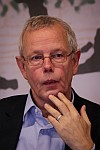Council of Europe demands freedom of Turkish people to demonstrate
Council of Europe demands freedom of Turkish people to demonstrate
Turkey must respect the freedom of its citizens to demonstrate and to express their opinions, instead of suppressing mass protest with excesses of police violence. A resolution to this effect was adopted today by the Parliamentary Assembly of the Council of Europe (PACE) in Strasbourg after a debate proposed by SP Senator Tiny Kox, leader of the European United Left political group in the Assembly.
 More than two and a half million people have taken to the streets in Turkey in recent weeks in order to protest against a range of controversial aspects of Prime Minister Erdogan’s government policies. What began as a small protest against plans to build on a park in central Istanbul ignited into a raging blaze when the police reacted with excessive violence. There ensued demonstrations and other actions in seventy-nine other Turkish towns and cities, during which, according to official government figures, over four thousand people have been wounded, though the Turkish medical association says that the real tally was going on for twice that number. Turkish security forces have systematically deployed tear gas, water cannons and rubber bullets, riding roughshod over internationally recognised rules of conduct. Four people, including a police officer, have lost their lives.
More than two and a half million people have taken to the streets in Turkey in recent weeks in order to protest against a range of controversial aspects of Prime Minister Erdogan’s government policies. What began as a small protest against plans to build on a park in central Istanbul ignited into a raging blaze when the police reacted with excessive violence. There ensued demonstrations and other actions in seventy-nine other Turkish towns and cities, during which, according to official government figures, over four thousand people have been wounded, though the Turkish medical association says that the real tally was going on for twice that number. Turkish security forces have systematically deployed tear gas, water cannons and rubber bullets, riding roughshod over internationally recognised rules of conduct. Four people, including a police officer, have lost their lives.
Senator Kox expressed satisfaction at the outcome of today’s debate in Strasbourg, noting that the Council of Europe is the latest in a long line of international organisations to speak out for the rights of the Turkish people to express their views and to demonstrate. ‘The Council of Europe, of which Turkey is one of a total of forty-seven member states – is demanding that freedom of association, which includes unorganised and unauthorised protest (as formulated in Article 11 of the European Convention on Human Rights) be henceforth full respected,’ Kox explained. ‘It’s the authorities’ task to guarantee the right to demonstrate and not to deny it. Where necessary Turkey should amend its legislation in relation to this, and also where it concerns the right to free media and freedom of expression. Turkey was tasked with conducting an in-depth enquiry into the excessive and disproportionate violence employed by the security forces and ordered to act against those found to be responsible. Police officers, legal officials and judges must be given better training in responding to mass demonstrations. The use of teargas should be limited, and banned completely in enclosed spaces. An end must be put to the hindrance and arrest of journalists and other representatives of the media. Criminal law and criminal legal procedure should be brought into line with relevant European norms. If Turkey does not comply, the country’s authorities will be failing in their responsibilities and isolating itself from European legal standards. No-one wants to see that.’
